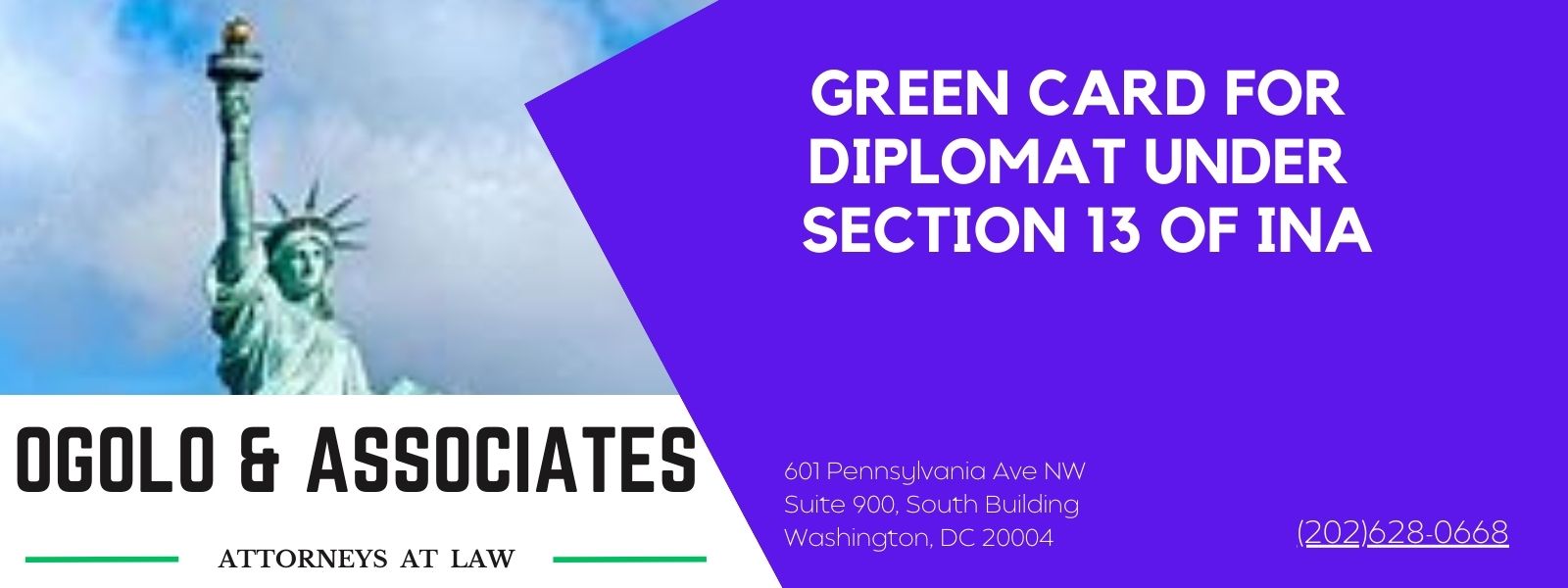Adjustment of status to that of a permanent residence under section 13 of the Immigration & Nationality Act is limited to aliens who were admitted into the United States under section 101, paragraphs (a)(15)(A)(i), (a)(15)(A)(ii), (a)(15)(G)(i) or (a)(15)(G)(ii) of the Immigration & Nationality Act who performed diplomatic or semi-diplomatic duties and to their immediate family members. Stated differently, this section applies to aliens who were admitted into the United States as an A-1, A-2, G-1 or G-2 nonimmigrants.
The benefits enumerated in this section is different from those accorded retirees of International Organizations based in the United States and the requirements are different. One may be eligible for the so-called Section 13 of the INA benefit, if they establish the following:
-
That they entered the United States as an A-1, A-2, G-1 or G-2 nonimmigrants.
-
They failed to maintain that status
-
Their duties were diplomatic or semi-diplomatic (not custodial, clerical or of a menial nature)
-
There are compelling reasons why they or their immediate family member(s) are unable to return to the country which accredited them as a diplomat and that their adjustment of status would be in the national interest of the United States
-
That they are a person of good moral character
-
They are admissible to the United States for permanent residence
-
Their admission as a permanent resident would not be contrary to the national welfare, safety or security of the United States
THOSE ELIGIBLE FOR BENEFITS UNDER SECTION 13
The two classes of beneficiaries under section 13 are the principal alien and his/her immediate family members. Principal alien is defined as an alien from whom another alien derives a privilege or status under the laws or regulations. The principal alien in the context of Section 13 of the INA are diplomats and other foreign government officials that come to the United States to engage solely in official duties or activities on behalf of their national government.
On the other hand, immediate family members are the spouses and unmarried sons and daughters who are household members of the principal alien. An immediate family member may also be a person who will regularly reside in the household of the principal alien. They include
-
Any other relative, by blood, marriage, or adoption of the principal alien
-
A domestic partner; and
-
A relative by blood, marriage or adoption of the domestic partner.
FAILURE TO MAINTAIN STATUS
A diplomat who is in status is not eligible to apply for adjustment of status to that of a permanent resident. A diplomat has to be out of status to qualify and/or be able to apply for green card. The question is how do one lose status to qualify. If the home country recalled a diplomat and he or she refused to return home, he or she definitely will be out of status once the authorized stay expired. If a diplomat is relieved of his duties by the home government, he or she will become out of status. Accordingly, the diplomat and his/her immediate family members will be eligible to apply for adjustment of status in the United States.
FAILURE TO RETURN TO HOME COUNTRY
A foreign diplomat and his/her immediate family members will be eligible to apply for adjustment of status if they can provide compelling reasons why they are unable to return to their home country. The legislative history of section 13 shows that it was intended to provide adjustment of status for a limited class of “worthy persons” left homeless and stateless as a consequence of uprisings, aggression or invasion that wiped out the government in power at the time they were appointed to the United States for diplomatic purposes. Congress intended that the phrase “Compelling reasons” relate to political changes in the home country that rendered the diplomats and foreign officials or representatives “stateless or homeless” or at risk of harm following political upheavals in the country represented by the foreign officials. The phrase “compelling reasons” must be read in conjunction with the word “unable” to correctly interpret its meaning and context. Mere inconvenience, economic hardship or the desire to remain in the United States for family reasons are not enough. Subjective fear of harm in the home country is not enough.
NATIONAL INTEREST TO THE UNITED STATES
Lastly, the applicant must be able to prove that his/her adjustment of status to that of a permanent resident will serve the national interest of the United States, Section 13(b) of the INA. The national interest contemplated by the Act are such as the promotion of democracy and human rights in the home country, regionally or globally. The mere establishment of business and payment of taxes in the United States is not enough. Sustained efforts to promote and strengthen relationships, economic and political ties between the United States and the home country will suffice. Promotion of trade, investment and business between the two countries will go a long way to satisfy the national interest requirement.

